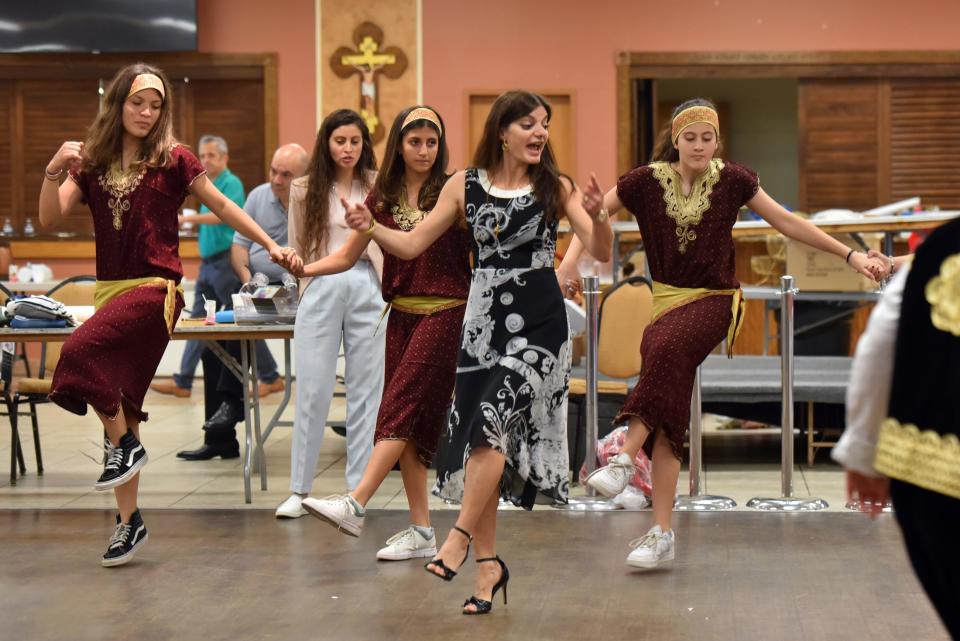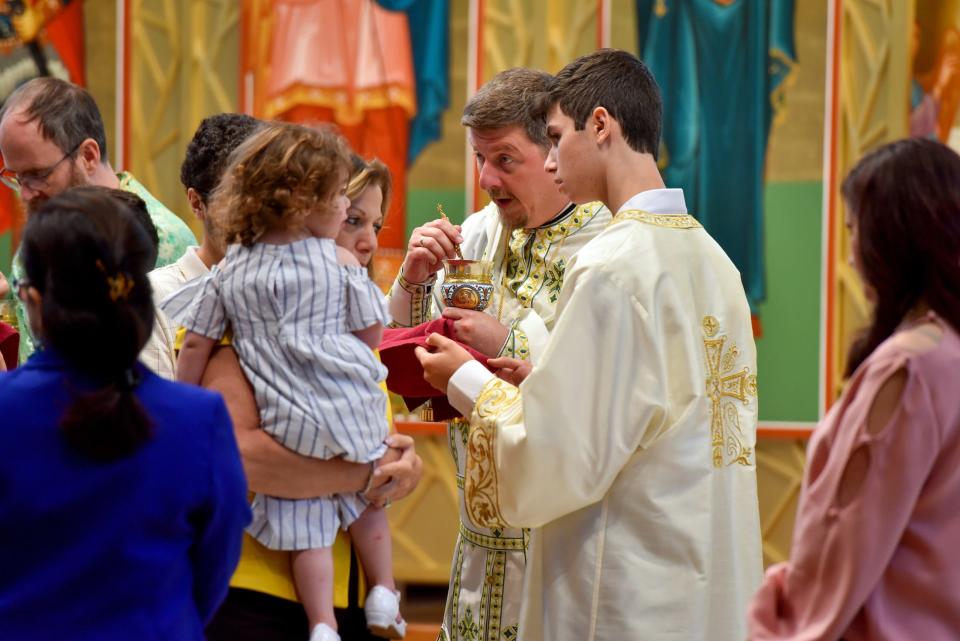Steeped in Middle Eastern traditions, a Little Falls church celebrates 100 years
- Oops!Something went wrong.Please try again later.
St. George Antiochian Orthodox Church sits atop a grassy hill in Little Falls. With a large rooftop cross and towering hexagonal walls of brick and glass, it's a testament of faith with a modernist feel.
But what’s inside those walls is steeped in history and ancient tradition.
Just over a century ago, Christians from what is now Syria and Lebanon came to North Jersey and founded St. George's to worship in Arabic and follow the Eastern Orthodox rites of their homeland. Today, hundreds of families are still active in the church, including descendants of its founding members.
This year – two years delayed due to COVID – they are finally celebrating the church's centennial.
“In the sea of American culture, it was so important to hold onto the faith," the Rev. Nicholas Belcher, the church's pastor, said in an interview. "Faith was central to their life. It’s beautiful that, for 100 years now, it has endured,”
The church has continued to fill pews for services despite growing secularization among Americans and the passing of the generations. Church leaders say strong family bonds, social connections and the timeless quality of their religious rituals have been key to keeping the faith.
In late May, hundreds of families gathered for a banquet and a liturgy to mark the 100th anniversary. The service was presided over by Metropolitan Joseph, the head of the Antiochian Orthodox Christian Archdiocese of North America.
Priests prayed at the altar behind an iconostasis, a screen with paintings of holy figures including Jesus, Mary and the saints. They emerged carrying the Book of the Gospels and offerings of bread and wine. In unison, parishioners chanted sacred music from the Byzantine Era in Arabic and English.
‘That's Uncle Tony'
Michael Kabbash recalled his grandfather's arrival in the U.S. around 1910. Like many Syrian immigrants, he worked in the silk mills that lined the Passaic River and gave Paterson its “Silk City" nickname.
The community began holding worship services at people’s homes and at a rented Lutheran hall, but they wanted a place of their own.
About 50 families pooled savings to buy a three-story grammar school in Paterson, including women who sold gold jewelry on the streets of downtown Paterson to help fund the effort. St. George’s Antiochian Church opened its doors on W. 27th Street, now Carlisle Avenue, in 1921.
"My father would look back and tell stories," Kabbash said. "They knew people socially in the neighborhood, but their friends were the people in the church. They vacationed together."
The community at the time gathered at Syrian-owned grocery stores and a social club on Main and Grand streets where people played backgammon. They founded three churches, including St. George, with services in Arabic.
As families grew over the decades, St. George's no longer fit its space. Sunday school was held in trailers. In 1974, the church moved to its current home on Long Hill Road in Little Falls.
“The community really is tight-knit,” said Kabbash, chairman of the 100th Anniversary Committee. “We joke when we bring neighborhood friends to festivals, ‘That’s Uncle Tony, that’s Aunt Pearl, that’s my cousin.’ We’re not really related. We just grew up together.”
Ms. Marvel: Disney+'s Ms. Marvel has deep NJ cred. A look inside the school that inspired her story
Building bridges: Can a bagel brunch in Pompton Lakes bridge Jewish-Muslim divide? This NJ group is trying
Kabbash, 54, grew up in Clifton and now drives about an hour from his home in Bridgewater to Sunday church. He sings in the choir, and his son is an altar server.
Others have found a place in St. George's Ladies’ Society, the Charity Committee and the teen youth organization, while Sunday school fills 10 classrooms each week. Children and teens also go to a summer camp in Pennsylvania that’s run by the Antiochian Archdiocese.
There are church parties and the annual St. George’s Summer Festival with Middle Eastern food and dancing, taking place this year June 16 to 18.
For Claire Levash, the church is a part of her family’s life and history in America. Her father helped purchase the property for the Paterson church and her great uncle broke ground both there and in Little Falls.
“I still have the shovel that they gave him as an honoree,” Levash said.
Her grandchildren, a 2-year-old and a newborn who will soon be baptized, are among the newest members.
'You are in another world'

Levash described an air of spirituality that envelops visitors at the door. In Orthodox tradition, the church has colorful stained glass and paintings of Jesus, Mary and several saints.
Chanters sing ancient Byzantine hymns, while the scent of incense rises to the rafters, symbolizing the prayers of the faithful rising to heaven.
“You walk in there and feel like you are in another world,” Levash said. “That’s what you want – to get out of the secular world and go into the spiritual world.”
The ancient rites and iconography reflect a religious tradition that began in Christianity's earliest days. Peter, one of the 12 apostles of Jesus, founded a church in Antioch of Syria (now part of modern-day Turkey) to which they trace their roots.
The Orthodox Church has about 250 million members worldwide, including about 100,000 in the U.S. and Canada, according to its website. The Archdiocese of North America, with more than 275 cathedrals, churches and missions, is headquartered in Englewood.
In the U.S., the majority of Arab Americans are Christian, with many descended from the first significant wave of immigrants from the region, who came between the 1880s and 1924, when federal lawmakers restricted immigration.
At that time, two other churches were founded in Paterson to serve immigrants from the region. They are active today, although they too have moved: Sacred Heart Armenian Catholic Church in Little Falls and St. Ann Melkite Catholic Church in Woodland Park.
Ancient traditions, new worshippers

Over the years, St. George’s has faced challenges. After Sept. 11, vandals sprayed anti-Arab graffiti on the front doors with a message to “go home.”
The church has grappled with how much Arabic to include for a congregation that wants to keep tradition and be inclusive for both youth and new immigrants. While St. George’s services began in Arabic, today they are mostly in English. Arabic is still used in Byzantine chants and in a bilingual reading.
More: Thousands of Syrians fled to the US. Ten years later, their lives tell stories of resilience
Some have moved away or married outside the faith. But the church has also welcomed converts and recent immigrants, including families who fled the war in Syria that broke out in 2011 and turmoil in Lebanon. St. George’s Charity Committee has helped refugees inside and outside the church with rent assistance, furniture and groceries.
They are also trying to get back to the attendance they had before COVID lockdowns, Levash added.
Today, St. George’s has about 570 registered families, including at least 300 who are active in the church, Belcher said.
In 2020, he became the first non-Arab pastor to lead the church. Belcher's parents were converts to the Orthodox faith and his wife is Lebanese.
“The people we have in our church, when they read the Bible, they don’t have to imagine it in their head or think of a Charlton Heston movie,” he said. “They’ve grown up in those places. They know the streets in Damascus. They know the cedars in Lebanon. They know where Jesus walked in Palestine."
"These are servants who have held on to faith through centuries."
Hannan Adely is a diversity reporter covering Arab and Muslim communities for NorthJersey.com, where she focuses on social issues, politics, bias and civil rights. To get unlimited access to the latest news, please subscribe or activate your digital account today.
Email: adely@northjersey.com
Twitter: @adelyreporter
This article originally appeared on NorthJersey.com: St. George Antiochian Church in Little Falls NJ marks 100th years

